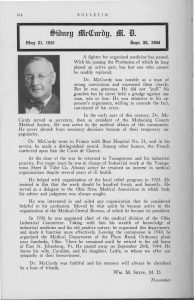~This post courtesy Cassie Nespor, Curator, Maag Library University Archives and Special Collections at Youngstown State University
The Melnick Medical Museum at Youngstown State University is a small medical history museum that focuses on preserving and promoting the medical history of the Mahoning Valley. In addition to preserving tools, documents, and photographs, the museum has a complete collection of the monthly bulletin published by the county medical society starting in 1931 and continuing (quarterly) today. The scope of the Bulletin extends even further into the past through an early series called “Biographies of the Living.” These journals have been a valued resource for me as a curator and sole employee of the Museum. I have used them to research the leaders and members of the local medical community for exhibits and outreach programs. This local information helps visitors relate to the stories in the museum. I also use the Bulletins to answer reference questions about old doctors in Youngstown and research donors of artifacts in the museum’s collection.
In 2014, we started the process to digitize the Bulletins. The Mahoning County Medical Society agreed to let the Medical Museum publish their Bulletin on the University’s digital archives – Digital.Maag. We scanned issues from their collection to fill in some small gaps in the Museum’s collection. Dr. John Melnick (1928- 2008), the founder of the Medical Museum in 1985, was an active member of the Medical Society and also served a term as editor of the Bulletin. The Medical Society added a link from their website to the University’s online repository so that their current members would have easy access to past issues of their Bulletin. Over two years, we were able to upload the first 25 years of the Bulletin to Digital.Maag. These magazines are a wonderful source of local medical and health history. The Bulletins have articles about physicians receiving awards and doing research, local hospital news, information about public health services, and advertisements for local health-related products and businesses. As I wrote abstracts for each issue, I learned how the local medical community handled childhood immunizations and payment by indigent patients during the Depression. A perfect example is this article “Our Opportunity for Public Approval” by Dr. H.E. Hathhorn in the April 1935 issue.
This was helpful, but Digital.Maag could not provide full text searching of the entire digital collection. When I learned about the State Medical Society journal collection on the Medical Heritage Library, I felt justified in the value I placed in the county medical society publication and I continued my efforts to make them more useful for research through our site. Last summer, I met Melissa Grafe at a conference and she encouraged me to add the digitized collection to the Medical Heritage Library. I worked with Hanna Clutterbuck-Cook over the fall to upload the first batch to the Internet Archive.
Within a week of the full-text search capability becoming live, I started using the collection for research I was doing into the doctors who served in the World War I Base Hospital 31 from Youngstown. It was wonderful! It was so easy to trace members’ activities in the Medical Society and in the community. It provided those personal details that I needed to make these men come alive. For example, this remembrance printed for Dr. Sidney McCurdy by a fellow doctor in November 1944.

Our next step is to upload the next 25 years (1957-1982), which will probably be ready this Spring. This collection will continue to be useful to me, providing insight into the lives and work of doctors in the Youngstown area. It will also be a valuable resource to other researchers, documenting how national laws, trends, and medical advancements trickled down to affect the daily lives of doctors and patients.





